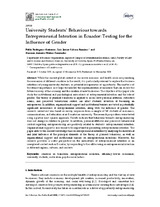Mostrar el registro sencillo del ítem
University Students’ Behaviour towards Entrepreneurial Intention in Ecuador: Testing for the Influence of Gender
| dc.contributor.author | Rodríguez Gutiérrez, Pablo | |
| dc.contributor.author | Cabeza-Ramírez, Luis Javier | |
| dc.contributor.author | Muñoz Fernández, Guzmán Antonio | |
| dc.date.accessioned | 2020-11-16T13:24:02Z | |
| dc.date.available | 2020-11-16T13:24:02Z | |
| dc.date.issued | 2020 | |
| dc.identifier.uri | http://hdl.handle.net/10396/20716 | |
| dc.description.abstract | While the current global context of successive economic and health crises are punishing the economies of different countries in the world, it is particularly relevant to explore the business intentions of young university students, as potential entrepreneurs of opportunity. This matter is of the utmost importance, as it helps to facilitate the implementation of measures that can ensure the future recovery of the economy and the creation of new businesses. The objective of this paper is to study the institutional and psychological antecedents of entrepreneurial intention and the role of gender. The theory of planned behaviour is applied to assess how personal attitudes, subjective norms, and perceived behavioural control can affect students′ intention of becoming an entrepreneur. In addition, organizational support and institutional barriers are tested as potentially significant antecedents of entrepreneurial intention, along with the influence of gender. The research carried out was based on survey responses from a sample of 740 students of economics, communications, and education at an Ecuadorian university. The research propositions were tested using a partial least squares approach. Results indicate that behaviour towards entrepreneurship does not change in relation to gender. In addition, personal attitudes and perceived behavioural control regarding entrepreneurship are positively related to students′ entrepreneurial intention. Organizational support is also found to be important for generating entrepreneurial intention. The paper adds to the current knowledge base on entrepreneurial intention by analysing the individual and joint influence of the principal elements of the theory of planned behaviour, as well as organizational support and institutional barriers on entrepreneurial intentions. Moreover, the research provides a useful perspective on the antecedents of entrepreneurial intention in an unexplored context such as Ecuador, by responding to the call focusing on entrepreneurial intention in different regions, cultures, and contexts. | es_ES |
| dc.format.mimetype | application/pdf | es_ES |
| dc.language.iso | eng | es_ES |
| dc.publisher | MDPI | es_ES |
| dc.rights | https://creativecommons.org/licenses/by/4.0/ | es_ES |
| dc.source | International Journal of Environmental Research and Public Health 17(22), 8475 (2020) | es_ES |
| dc.subject | Countries in transition | es_ES |
| dc.subject | Entrepreneurial intention | es_ES |
| dc.subject | Efficiency-driven economies | es_ES |
| dc.subject | University students | es_ES |
| dc.subject | Motivation | es_ES |
| dc.subject | Psychosocial factors | es_ES |
| dc.title | University Students’ Behaviour towards Entrepreneurial Intention in Ecuador: Testing for the Influence of Gender | es_ES |
| dc.type | info:eu-repo/semantics/article | es_ES |
| dc.relation.publisherversion | http://dx.doi.org/10.3390/ijerph17228475 | es_ES |
| dc.relation.projectID | Junta de Andalucía. SEJ-063 | es_ES |
| dc.rights.accessRights | info:eu-repo/semantics/openAccess | es_ES |

